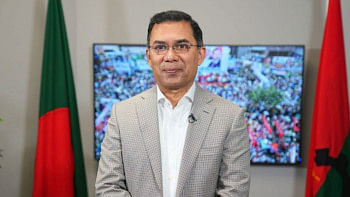Oli's ouster engineered?

Nepal has set a record in changing prime ministers; in the past 26 years the country had 23 prime ministers. Sticking to the tradition, the nine-month old incumbent government resigned on July 23, 2016 to make way for a new administration.
Khadga Prasad Sharma Oli, Chairman of CPN (UML), was sworn-in as prime minister on October 12, 2015 and headed a coalition government supported by Communist Party of Nepal-Maoist Center (CPN-MC), Rashtriya Prajatantra Party (RPP), Madhesi People's Rights Forum-Democratic (MPRF-D), along with 13 other smaller parties.
On July 12, 2016, Pushpa Kamal Dahal (Prachanda), leader of CPN-MC, withdrew support to K. P. Oli accusing him of failing to honour agreements. The following day, a no confidence motion was filed in the Parliament. Oli decided to tender his resignation to the President before the vote, when the Nepali Congress, RPP and MPRF-D decided to jump on the bandwagon of Dahal.
In his valedictory speech on July 24, Oli said that the no-confidence motion was a "sudden attack" and was "mysterious". He said the move was "democratic in form, but conspiratorial in essence". It was not natural, considering its moment, condition and nature, he added. He also accused Dahal of practising "politics without morality" and "making politics dirty". He was "sad" that the government was changing at a time when it was overcoming the hindrances to reconstruction that the deadly earthquakes caused in 2015. He further warned that the nation would have to pay a high price for it.
Referring to ties with neighbouring countries, Oli said that his government promoted relations with India and China based on national independence, signing some trade agreements with China, thereby ending dependence on a single nation for trade and commerce, and turning the nation into "land-linked" from "land-locked".
To obviate the effects of the five-month long crippling economic blockade by India in September 2015, Nepal signed 10 agreements, including a landmark transit trade deal, with China when Oli visited Beijing in March 2016. Oli hoped that the transit deal would end India's monopoly over Nepali trade and commerce, and also relieve Kathmandu from pressures from Delhi. It has been described by analysts as "a major geo-political shift" in Sino-Nepali relations.
In earlier remarks, the veteran communist leader said, "Maintaining good relations with neighbouring countries is an important aspect of national security but we cannot jeopardise national security for the sake of maintaining good neighbourly relations". However, he further added that interference in internal affairs of Nepal cannot be accepted, even though the country wants "good relations" with their neighbours.
Just before Prachanda pulled the rug from under Oli, the Nepali Congress, which was vehemently against Maoists, made an unholy deal with CPN-MC, which paved the way for Dahal to become the next Prime Minister. The seven-point agreement stipulates that Dahal will lead the government for the first nine months and then hand it over to NC President Sher Bahadur Deuba. As per the agreement, Dahal will hold local elections that have not been held for the past 20 years. Then Deuba will arrange the elections of provincial assemblies before the national elections in January 2018.
Nepali Congress and CPN-MC together have 289 members in the Parliament of 597 seats. The Madhes-based parties have 39 seats, which will play a vital role in the formation of the next government. However, it may prove costly for Dahal to cobble together a coalition, given his violent credentials.
The current sequence of events cannot be seen in isolation to the happenings over the past two years. The drafting of the Constitution has actually created a deep schism in the Nepali society. The Indian origin Madhesis living in Terai, the southern plains bordering India, constitute 51 percent of the total population. The major party leaders, mostly upper caste Hindus from the hills known as "Pahadis", have not yielded to the demands of the Madhesis who are backed by Delhi. The blockade of Nepal by India and subsequent political unrest related to the new Constitution has cost more than 50 lives. The polarisation between the "Pahadis" and Madhesis is so deep that a threat for secession is gaining momentum in Terai.
India's External Affairs Ministry has considered K.P. Oli as an "ultra nationalist", and his Left-led alliance was perceived to be anti-Indian and pro-China. Despite repeatedly raising the Madhesi issue with Kathmandu to be more flexible to accommodate their demands, Prime Minister Oli did not budge from his stance. Another reason for Delhi's ire over K.P. Oli was his inclination towards Beijing. Under Oli, Nepal-India relations slumped to its lowest level ever. Political circles and media in Nepal openly accuse India for Oli's downfall. According to reports, Delhi now hopes that Oli's ouster will help restore balance in Nepal's relations with India. It is a pyrrhic victory for Delhi.
China, on the other hand, is worried about the political developments in Kathmandu. Chinese President Xi Jinping is scheduled to visit the Himalayan Republic later this year. Beijing had even tried to save K.P. Oli's government. But here, Delhi seems to have upstaged Beijing. According to some reports, the Nepali Congress, which is favoured by Delhi, prodded Dahal to topple Oli at Delhi's bidding. It is unlikely that Dahal will be able to change the Constitution and accommodate Madhesi demands, given the stiff opposition from Oli's UML.
It would be interesting to monitor how President Bidhya Devi Bhandari handles the incoming Maoist Supremo, who is expected to form the new government soon, as prime minister. To recall, Dahal in his earlier stint as prime minister was not a popular Head of Government. He resigned in anger, as former President Ram Baran Yadav refused to sack the then Army Chief.
As of now, the stage is set for more drama in Nepali politics.
The writer is former Ambassador and Secretary.


 For all latest news, follow The Daily Star's Google News channel.
For all latest news, follow The Daily Star's Google News channel. 



Comments